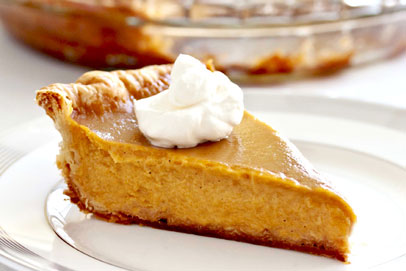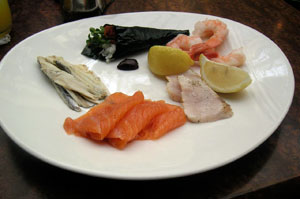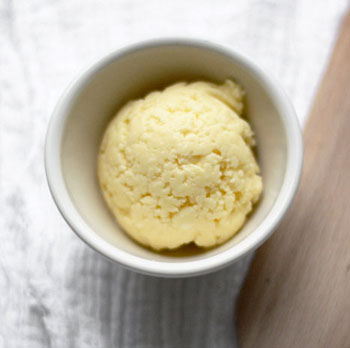 There are tons of pumpkin pie recipes, and in November all of the food shows and magazines are filled with both classic and innovative recipes. I think I’ve tried all of them – most started with canned pumpkin, and then the ingredients vary - some use heavy cream, others swear by evaporated milk, some are heavily spiced with cinnamon and cloves.
There are tons of pumpkin pie recipes, and in November all of the food shows and magazines are filled with both classic and innovative recipes. I think I’ve tried all of them – most started with canned pumpkin, and then the ingredients vary - some use heavy cream, others swear by evaporated milk, some are heavily spiced with cinnamon and cloves.
I love pumpkin pie, but have never found what I would call the BEST pumpkin pie until recently. I was watching an episode of America’s Test Kitchen (the leader in test perfected recipes) called “An Old-Fashioned Thanksgiving”. The ingredients and the method were quite original and I couldn’t wait to try it.
There are a few extra steps, but well worth it. If you don’t want to make your own crust, you can use a Pillsbury Ready Made crust. Feel free to alter the amount of cinnamon (I used Penzey's Extra Fancy Vietnamese Cassia Cinnamon Click here for Penzey's), but the fresh ginger is key to the pie’s flavor.

 Francois Truffaut has been famously quoted about the process of making a movie being similar to a wagon train crossing the country. You start out the journey with high hopes and the spirit of adventure and halfway through, you just want to get there alive.
Francois Truffaut has been famously quoted about the process of making a movie being similar to a wagon train crossing the country. You start out the journey with high hopes and the spirit of adventure and halfway through, you just want to get there alive. It's not about over-abundance, although it sort of is. I'm not the kind of person who loads their plate up full to the brim -- in fact, I don't even like it when my food groups touch, although that's part of it, too, I guess, the fact that you can have multiple plates, like as many as you want.
It's not about over-abundance, although it sort of is. I'm not the kind of person who loads their plate up full to the brim -- in fact, I don't even like it when my food groups touch, although that's part of it, too, I guess, the fact that you can have multiple plates, like as many as you want. No Thanksgiving dinner table is complete without cranberry sauce. Cranberries and turkeys are both native to North America, so it's fitting that they have come to represent the holidays not to mention
the wonderful pairing they make. Many of us have become accustomed to
the cranberry sauce that slides out of a can. But it's really not that
elegant. Cranberry sauce, compote, or chutney made from scratch is so
much more special. For many years now I've been making one or the
other. When guests who have only ever eaten canned sauce try my
compote, they swear never to back to canned again. Fresh cranberries
can be found everywhere in supermarkets this time of year. Combine them
with other fruits and spices to create a very flavored sauce that
everyone is sure to enjoy.
No Thanksgiving dinner table is complete without cranberry sauce. Cranberries and turkeys are both native to North America, so it's fitting that they have come to represent the holidays not to mention
the wonderful pairing they make. Many of us have become accustomed to
the cranberry sauce that slides out of a can. But it's really not that
elegant. Cranberry sauce, compote, or chutney made from scratch is so
much more special. For many years now I've been making one or the
other. When guests who have only ever eaten canned sauce try my
compote, they swear never to back to canned again. Fresh cranberries
can be found everywhere in supermarkets this time of year. Combine them
with other fruits and spices to create a very flavored sauce that
everyone is sure to enjoy. Lately, we have spent a lot of time contemplating the ways to explain Thanksgiving to Dane. We are diving into the stories of Pilgrims and Indians, but what I deeply want to convey to her this year, are the two sides of thankfulness - to give thanks for what we receive, while also finding joy in giving, so that we may create thankfulness in the hearts of others. I tend to teach her in ways that are tangible, so when I thought of our activities this week, the Thanksgiving feast came to mind.
Lately, we have spent a lot of time contemplating the ways to explain Thanksgiving to Dane. We are diving into the stories of Pilgrims and Indians, but what I deeply want to convey to her this year, are the two sides of thankfulness - to give thanks for what we receive, while also finding joy in giving, so that we may create thankfulness in the hearts of others. I tend to teach her in ways that are tangible, so when I thought of our activities this week, the Thanksgiving feast came to mind. 